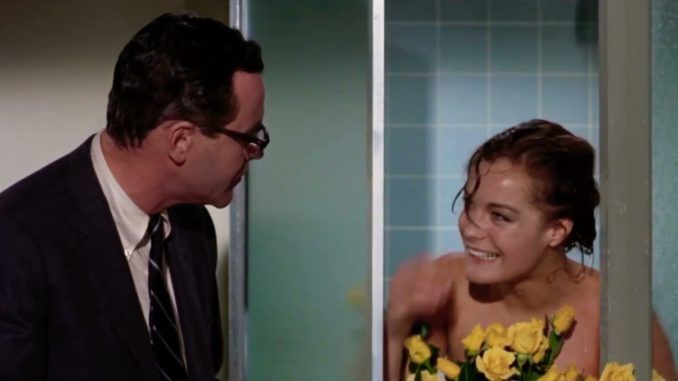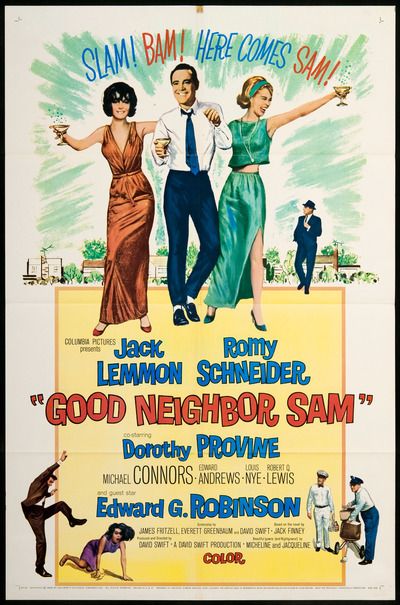
Rating: B-
Dir: David Swift
Star: Jack Lemmon, Romy Schneider, Dorothy Provine, Edward G. Robinson
Came to this in a very roundabout way, Chris remembering it because we saw supporting actor Louis Nye, in his role as the father of Larry David’s agent in Curb Your Enthusiasm. But it is an entertaining work, if undeniably overlong; no comedy should ever require 130 minutes. It’s as much a time capsule, showing us life back in a distant time, when literally everybody wore hats. The hero is Sam Bissel (Lemmon) a low-level copy writer at ad agency Burke and Hare(!), happily married to Minerva (Provine), with two kids and a suburban home. He gets a break when moralistic client Simon Nurdlinger (Robinson) demands an upstanding and vice-free account executive: Sam is the only employee who qualifies.
However, visiting is Minerva’s best friend and top-shelf EuroTotty, Janet Lagerlof (Schneider), recently separated from her husband. Janet discovers she’s in life for a $15 million inheritance (worth ten times that today), but only if she’s married. Ever-helpful Sam agrees to help and play the part of her husband, but after greedy cousins set a PI (Nye) on Janet’s tail, the con becomes more complex. Especially after her real husband shows up; he gets to play the part of Mr. Bissel and moves in with Minerva. But neither she nor Sam are exactly happy with the new arrangements, both concerned their other half might prefer the new spouse. Things spiral increasingly out of control, while Sam tries to stop the truth from being revealed.
 It plays like a feature version of Fawlty Towers, with an “innocent” lie slowly turning into farce. Though I did wonder how a $15m fraud scheme quite gels with Sam’s good-guy image. It’s clearly of a different era. Sam says, “Good, clean-living, family type men, don’t go around making love with their next door neighbors on the street corners.” Given this is set in San Francisco – a SF with one (1) homeless person – the contemporary irony is industrial strength. Other aspects, though, are almost prophetic: the notion a customer can weaponize the private lives of those he does business with. Or Mrs. Nurdlinger saying, “My woman’s club is starting a purge on the evil, obscene publications which litter our libraries and our newsstands. I’d love to have Mrs. Bissell join us next Thursday for our weekly book burning, if she’s free.”
It plays like a feature version of Fawlty Towers, with an “innocent” lie slowly turning into farce. Though I did wonder how a $15m fraud scheme quite gels with Sam’s good-guy image. It’s clearly of a different era. Sam says, “Good, clean-living, family type men, don’t go around making love with their next door neighbors on the street corners.” Given this is set in San Francisco – a SF with one (1) homeless person – the contemporary irony is industrial strength. Other aspects, though, are almost prophetic: the notion a customer can weaponize the private lives of those he does business with. Or Mrs. Nurdlinger saying, “My woman’s club is starting a purge on the evil, obscene publications which litter our libraries and our newsstands. I’d love to have Mrs. Bissell join us next Thursday for our weekly book burning, if she’s free.”
Almost every scene offers something like this to unpack. The way it takes an hour and forty minutes for the only non-white character to show up. When he does, it’s a judge. The use of LA’s iconic Bradbury Building, as seen in Blade Runner. Commercials filmed with a live orchestra, vocal quartet and stunt work simultaneously. All this, and humour too – although probably not quite enough for the running-time. But it’s amiable and mostly warm-hearted stuff, with no real antagonist to speak of. Despite the obviously archaic aspects, it has not dated badly, and Lemmon certainly shows why he was one of the decade’s leading comedic talents.
